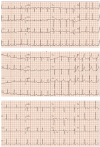Spontaneous coronary artery dissection in association with cabergoline therapy
- PMID: 33563672
- PMCID: PMC7875262
- DOI: 10.1136/bcr-2020-240022
Spontaneous coronary artery dissection in association with cabergoline therapy
Abstract
Spontaneous coronary artery dissection (SCAD) is a rare but increasingly recognised cause of acute coronary syndrome. While numerous risk factors are associated with SCAD, one potential cause is coronary artery vasospasm. The use of cabergoline-an ergot derivative and dopamine agonist that may induce vasospasm-has been associated with SCAD in one other case report worldwide. Here, we describe SCAD in a 37-year-old woman on long-term cabergoline therapy with no other cardiac risk factors. Cabergoline-induced SCAD should be considered in patients presenting with an acute coronary syndrome who are treated with this medication.
Keywords: cardiovascular medicine; drugs: endocrine system.
© BMJ Publishing Group Limited 2021. No commercial re-use. See rights and permissions. Published by BMJ.
Conflict of interest statement
Competing interests: None declared.
Figures
References
-
- Heart and Stroke Foundation of Canada Spontaneous coronary artery dissection [Internet]. Heart and Stroke Foundation of Canada, 2020. Available: https://www.heartandstroke.ca/heart/conditions/spontaneous-coronary-arte...
-
- JWL S, Hassan S S, et al. . Outcomes of percutaneous coronary artery intervention in patients with non-atherosclerotic spontaneous coronary artery dissection. J Am Coll Cardiol 2018;7:A6.
Publication types
MeSH terms
Substances
Supplementary concepts
LinkOut - more resources
Full Text Sources
Other Literature Sources
Medical

